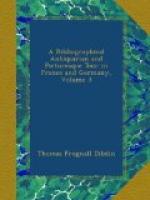[13] See vol. ii. p. 73.
[14] See Ottley’s History of Engraving,
vol. i. p. 86; where a
fac-simile of this cut is
given—which, in the large paper copies,
is
coloured.
[15] See vol. ii. p. 134-5.
[16] The SFORZIADA: See the Catalogue of his Library, no. 7559.
[17] The prologue of this metrical life begins thus:
Ecce
tuis parui uotis uenerande sacerdos
Cor
quia de vro feruet amore mihi
Pontificis
magna wilbroodi et psulis almus
Recurrens
titulis inclyta gesta tuis
Sit
lux inferior strepitant cum murmure rauco
illius
egregi^{9} sermo meus meritis
This life consists of only
11 leaves, having 23 verses in a full page.
It is printed in the Lect.
Antiq. of Canisius, vol. ii. p. 463;
and the prose life is printed
by Surius and by Mabillon.
[18] Before described in the Bibl. Spenceriana; vol. IV. p. 508.
[19] The book in question has the following colophon:
Hoc opus exiguum perfecit rite iohannes Fabri: cui seruat lingonis alta lares. Ac uoluit formis ipsum fecisse casellis. M.cccc.lxxcii de mense maii.
The s is very singular,
being smaller than the other letters,
and having a broken effect.
This copy, in the Public Library at
Stuttgart, is not bound, but
in excellent condition.
LETTER II.
THE ROYAL PALACE. A BIBLIOGRAPHICAL NEGOTIATION. DANNECKER THE SCULPTOR. ENVIRONS OF STUTTGART.
The morrow is come; and as the morning is too rainy to stir abroad, I sit down to fulfil the promise of last night. This will be done with the greater cheerfulness and alacrity, as the evenings have been comparatively cooler, and my slumbers, in consequence, more sound and refreshing. M. LE BRET—must be the first name mentioned upon this occasion. In other words, the negotiation about the two Virgils, through the zeal and good management of that active Head-Librarian, began quickly to assume a most decided form; and I received an intimation from Mr. Hamilton, our Charge d’Affaires, that the King expected to see me upon the subject at the “circle”—last Sunday evening.
But before you go with me to court, I must make you acquainted with the place in which the Court is held: in other words, with the ROYAL PALACE of STUTTGART. Take away the gilt cushion and crown at the top of it, and the front facade has really the air of a royal residence. It is built of stone: massive and unpretending in its external decorations, and has two wings running at right angles with the principal front elevation. To my eye, it had, at first view, and still continues to have, more of a Palace-like look than the long but slender structure of the Tuilleries.




